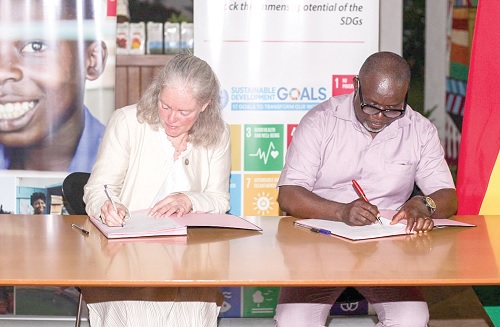
GMet receives climate action support
The Ghana Meteorological Agency (GMet) has received $5.5 million in support from the government to build a robust infrastructure to enable them to report timely on climate and weather conditions in the country.
The fund was provided under the Ghana Digital Acceleration Project to enable the agency to digitalise its operations.
The Deputy Minister of Communication and Digitalisation, Ama Pomaa Boateng, who made this known, said through the programme, GMet was expected to expand the number of weather stations across the country, transition from manual operations and integrate artificial intelligence data to produce accurate weather forecasts.
Additionally, she said the programme would enable GMet to establish early warning centres in parts of the country to support the World Meteorological Organisation’s Early Warning for All initiative.
It also aims to set up a common alert and early warning platform to onboard all stakeholders for weather warnings and extreme advisories.
The deputy minister was speaking at the signing of a strategic sector cooperation (SSC) on weather and climate change between GMet and the Danish Meteorological Institute (DMI), at the Embassy of Denmark in Accra, last Tuesday.
It is a collaboration between the two institutions to leverage technology, share expertise and build human resource capacity for the efficient delivery of relevant climate data to inform policy decisions.
The event was attended by various stakeholders.
Agreement
The Director-General of GMet, Eric Asuman, signed on behalf of the agency, while the Director-General of DMI, Marianne Thyrring, signed for her institute.
The Danish Ambassador to Ghana, Tom Norring, witnessed the signing ceremony which marked the commencement of the three-year programme (2024 – 2026).
Under the SSC, DMI would also help GMet to develop a climate atlas for Ghana and also build capacity of weather forecasters at GMet.
Ms Thyrring explained that the climate atlas was a tool that would be used to project physical changes in climate parameters such as temperature, precipitation, relative humidity, sea level rise, and greenhouse emission scenarios from now till the end of the century.
She added that the atlas, which was location-specific, would trickle down to the local level, requiring GMet to work with metropolitan, municipal and district assemblies (MMDAs) to feed projections into their climate plans.
The Danish Ambassador, Mr Norring, called for more collaborations to save the planet and generations yet unborn and gave an assurance that his country would support Ghana to spearhead climate actions for green transition in areas such as agriculture, food security, environmental protection and urban development.
Significance
For his part, Mr Asuman said the SSC would strengthen the use of climate and meteorological information in climate adaptation planning in the country’s early warning system.
He said it would also enhance GMet's capacity and expertise to deliver authoritative and pertinent climate information service; augment the agency's capacity to finish timely and relevant meteorological forecast service, and assist the agency to boost its digital efficiency to effectively manage and leverage historical climate and weather observation data.
Mr Asuman further said it would enable “farmers to optimise their planting season; water resources managers can plan for changing precipitation patterns, while public health officials can prepare for potential outbreaks influenced by climate conditions”.
